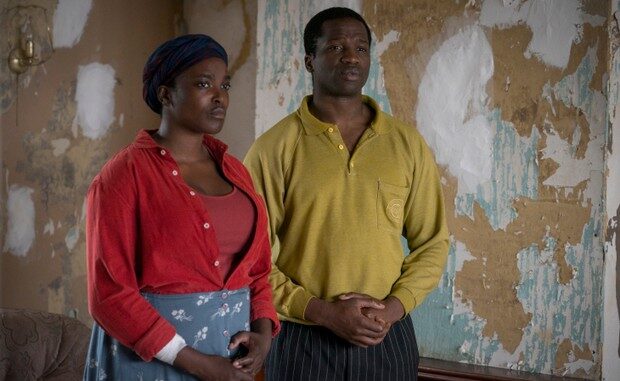
Fitting itself snugly into the Haunted House trope, the newly released Netflix film “His House” has all the fixings for a spooky Halloween movie night. However, the film extends past the creaky doors and mysterious creatures in the walls to highlight the horrors of the immigration system.
“His House” premiered on Netflix on Oct. 30, just in time to be watched the following day alongside a bag of Reese’s peanut butter cups in the shape of pumpkins. The feature directorial debut of Remi Weekes originally premiered at the Sundance Film Festival on Jan. 27.
Rial (Wunmi Mosaku) and Bol (Sope Dirisu) are a Sudanese couple seeking asylum in Britain from their war-torn home. The film opens in a flashback of the treacherous journey aboard an overcrowded motorboat. The couple survives, making it to England, but many others (including their daughter) do not. One of the main mysteries in the film is what exactly happened to the daughter. The viewer slowly pieces together this mystery through the flashbacks of the protagonists.
Three months after their travel, they are granted probational asylum in a crumbling house on the outskirts of London. There they will be terrorized by their trauma which, quite literally, takes on a life of its own, waiting for them around every corner and peering at them through the cracks in the walls.
The terror that Bol and Rial encounter in Britain is multifaceted. On one hand, Weekes serves viewers a (sometimes jarring) amount of supernatural violence — the ghosts and corpses (which, for the most part move around in the dark) torment the couple often — physically getting on top of Bol, and at one point under his skin. The effects are overly campy at times which takes away from the strong social commentary.
Weekes delivers a slow burn of psychological disturbance. We aren’t sure if the ghosts are real or not despite seeing them often. Even by the end of the film that is still up for interpretation. For example, through the eyes of social worker Mark (Matt Smith) the couple appears to be crazy and the viewer cannot help but wonder if they are.
There is also the struggle of how one adapts to a new environment as an immigrant. This struggle is personified and split between Rial and Bol. On one hand, Bol tries tirelessly to leave the past behind while Rial wants nothing more than to return home. In that they both interpret the messages of the demon differently according to their own struggle to adapt. This struggle, both internal and in terms of conflict between the couple, is both beautifully and painfully shown in the stellar performances delivered by Mosaku and Dirisu.
“His House” explores survivor’s guilt and is a journey into the darkness that is post traumatic stress. Highlighting an extremely relevant and timely sociopolitical issue, packaged neatly into the familiar framework of classic horror, the film is (in my opinion) worth a watch.
